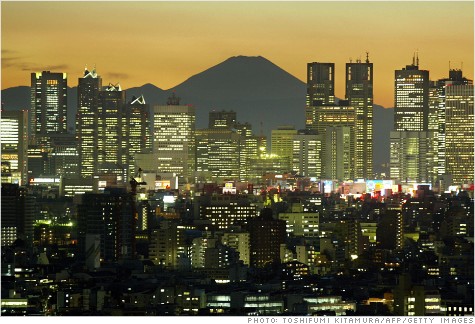
Tokyo faces fresh political uncertainty as the economy weakens.
HONG KONG (CNNMoney) -- Japan's prime minister dissolved the lower house of parliament Friday to avoid a disastrous freeze in government spending, triggering elections that could result in more aggressive policies to stimulate the country's economy.
Prime Minister Yoshihiko Noda's move, made under pressure from the main opposition Liberal Democrat Party, allows Japan to head off its own "fiscal cliff". In exchange for fresh elections, the LDP gave its support for bonds to be issued to finance government operations for the rest of the year, ending a long-running impasse.
But even with that short-term fiscal crisis averted, Japan still faces substantial challenges as the country seeks to recover from the tsunami and nuclear disasters that rocked the world's third-largest economy last year.
The Japanese economy contracted at an annual rate of 3.5% from July to September, a faster rate than economists had expected. One more quarter of negative growth, deemed likely by analysts, and the economy will be in recession.
Policymakers have limited options for combating the economic malaise. The country's debt-to-GDP ratio is the highest in the world. And much like in the United States, its leaders do not agree on the path most likely to restore growth.
Fitch, the ratings agency, said this week that it remains concerned about the "leisurely pace" of fiscal consolidation in Japan -- and political dysfunction.
"Further political volatility would increase concerns about the ability of the Japanese political system to deliver policies geared toward fiscal sustainability," the agency said in a statement.
Indeed, based on current forecasts in Japan, neither of the two main parties is likely to secure enough votes in the election to form a majority government. The LDP is led by Shinzo Abe, a former prime minister who stepped down citing health reasons in 2007 after only a year in office.
Related: Japan owns almost as much U.S. debt as China
Still, investors appear to be betting on a return to power for Abe, pushing up Japanese stocks and selling the yen this week on signs that he would push the Bank of Japan to relax monetary policy and adopt a higher target for inflation.
A new government may pursue fiscal stimulus as well. Analysts at Nomura said the chances of a supplementary budget for early next year had increased -- and could boost growth in 2013.
"We estimate that the supplementary budget will have around 700 billion yen in economic stimulus, assuming it will tap into 2011 surplus funds. Depending on the aims of the new cabinet, however, an even larger stimulus could be included in the supplementary budget," they said in a research note.
Japan faces another political dispute with economic implications in the form of a territorial row with China over a set of islands. Located in oil-rich waters, the islands have inspired protests in China that forced Japanese businesses to close. Trade between the countries has slowed, and Japanese automakers have reported dwindling sales in China.
Even if short and medium-term events break in Japan's favor, the country's debt levels are likely to remain very high.
"We are sure that whatever the election result next month, no active policies will be implemented that will make a meaningful dent in the debt-service mountain that Japan faces," Carl Weinberg of High Frequency Economics wrote on Friday.
![]()
First Published: November 16, 2012: 6:01 AM ET
Source: http://rss.cnn.com/~r/rss/money_topstories/~3/1Hswaow3DRo/index.html
seattle times walker recall censor pipa and sopa sopa pipa wikipedia blackout kyla pratt
No comments:
Post a Comment
Note: Only a member of this blog may post a comment.